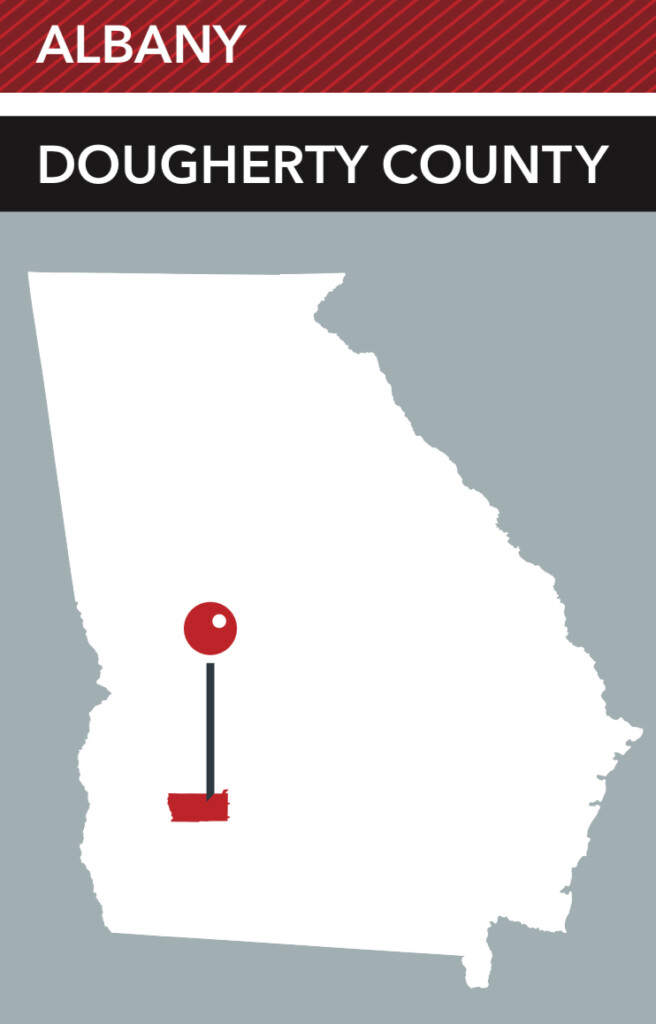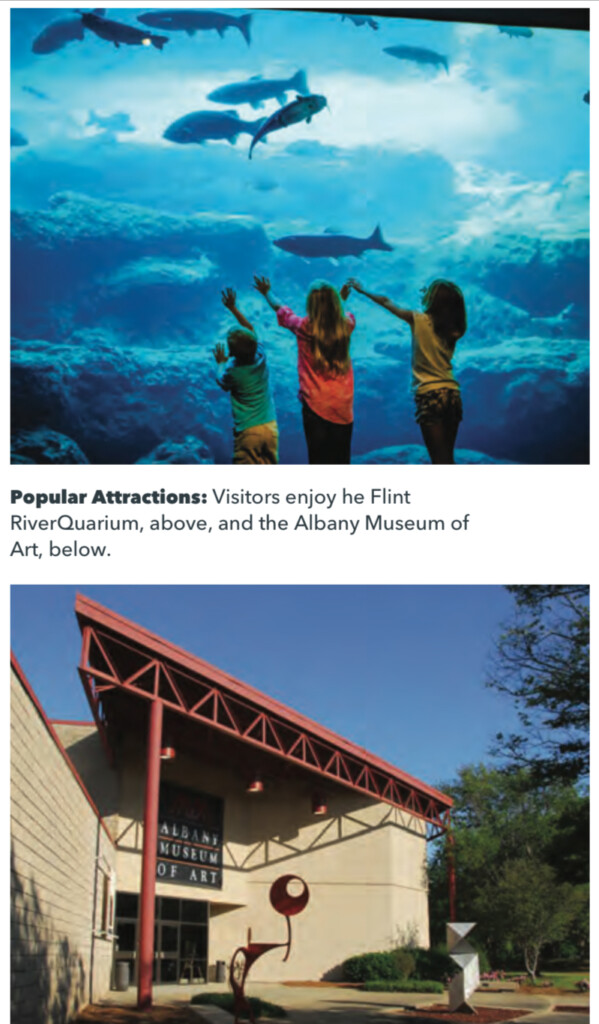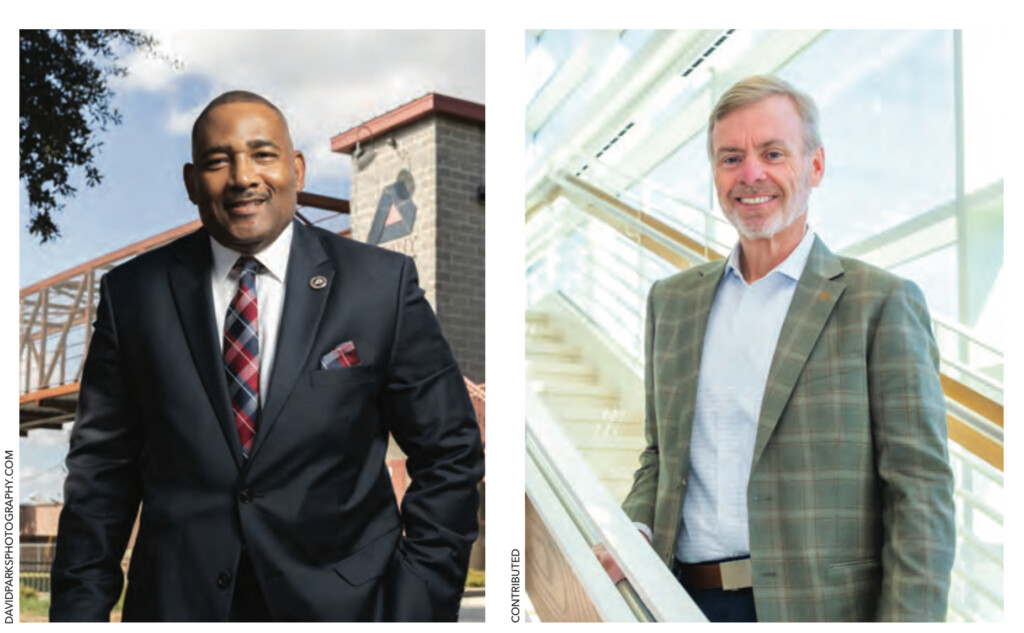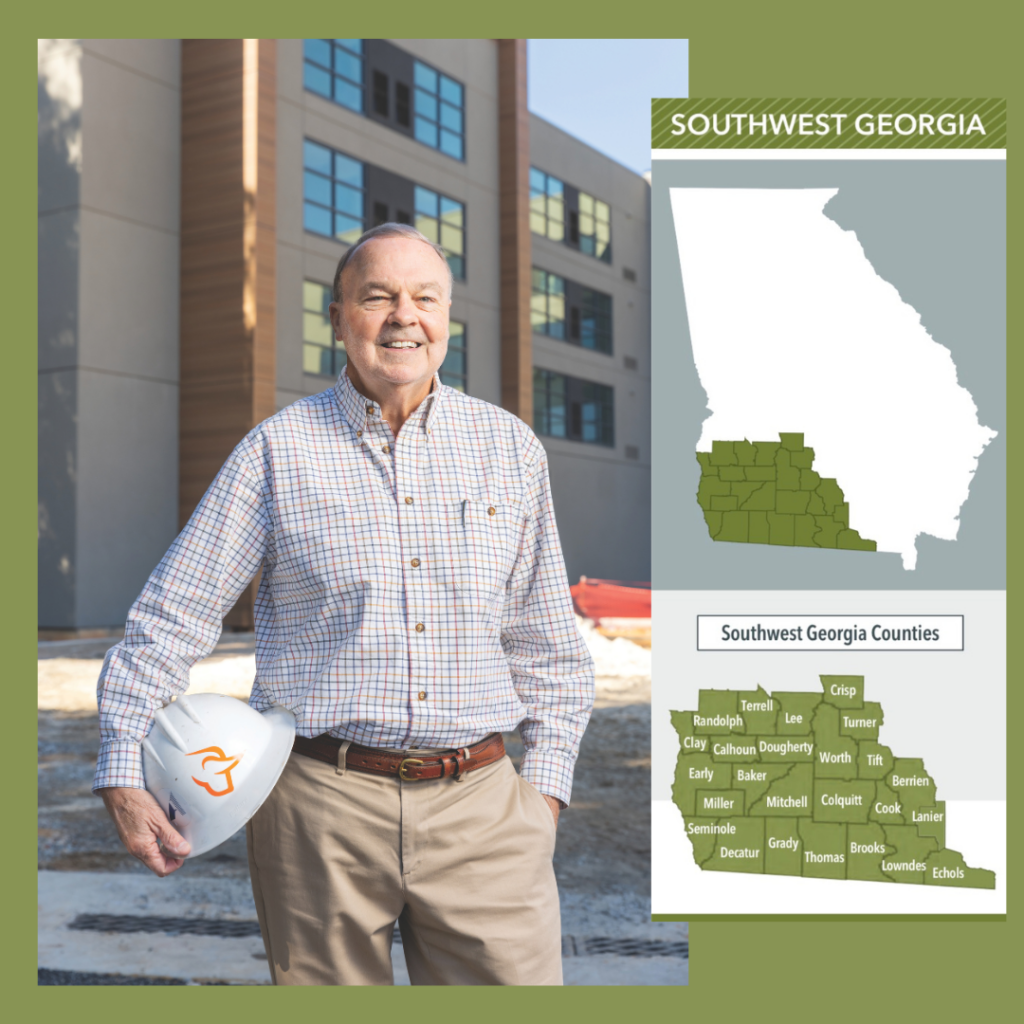Albany | Dougherty County: Building Momentum
Renewal, Investment, Partnerships
While national economic trends remain uncertain, Albany’s focus on long-term revitalization is unwavering. Mayor Bo Dorough is taking an active approach to reversing population decline and reinvigorating the city – from addressing local concerns to spearheading major infrastructure and development projects.
 Several key developments are underway. The historic St. Nicholas Hotel is slated to reopen in late 2025. “We’ll have 29 guest rooms, a restaurant and a lounge,” says Dorough. Meanwhile, the Davis Exchange project, which will transform a former bank building into 56 affordable apartments, requires “additional funding because of the escalation of construction cost,” according to Dorough. The city has also committed $4 million to support the Albany Museum of Art’s move to the old Belk department store, with additional funding expected through the county and funds and tax credits from the state Historic Preservation Office and National Park Service.
Several key developments are underway. The historic St. Nicholas Hotel is slated to reopen in late 2025. “We’ll have 29 guest rooms, a restaurant and a lounge,” says Dorough. Meanwhile, the Davis Exchange project, which will transform a former bank building into 56 affordable apartments, requires “additional funding because of the escalation of construction cost,” according to Dorough. The city has also committed $4 million to support the Albany Museum of Art’s move to the old Belk department store, with additional funding expected through the county and funds and tax credits from the state Historic Preservation Office and National Park Service.

Smart Governance: Lorenzo Heard, chair of the Dougherty County Board of Commissioners, at Radium Springs Photo credit: David Parks
Dorough says after the Hotel Gordon failed to gain historic designation due to structural changes, he successfully applied to designate all of downtown Albany as a historic district. In May, it was listed in the Georgia Register of Historic Places. So now, Dorough says, “the Hotel Gordon project would be eligible for tax credits as a contributing property.”
Improving public facilities is another priority. “There [have] been decades of disinvestment in city properties,” Dorough says. “We are doing what we can to improve the quality of life for our citizens and to make Albany a place people want to move to instead of away from.” Driskell Park reopened in January, and upgrades are underway at Henderson Community Center and Carver Gym.
Driskell Park has already seen increased use. “Participation is up,” says Dorough. “We have facilities for adult fitness. That has been a sound investment that’s going to pay dividends for decades to come.” Henderson Community Center, featuring a gym, community room and nearby walking trails, will soon go out for bid.

Sound Investment: The recently renovated Driskell Park reopened earlier this year. Photo credit: Contributed
Dorough says Carver Gym renovations will include a college-regulation basketball court and a tribute to Monroe High, which served as the school for Black students during segregation and was a center of activism for those seeking desegregation.
Tift Park’s history also encompasses past segregation: The park’s pool was constructed in 1953 and at one time was the only Olympic-sized pool in Southwest Georgia. But when it was built, Black people were barred from swimming there. Tift Park Zoo was established in 1908 as Albany’s first zoo. “You could hear the lions roar at night,” Dorough says. The zoo closed in 1977.
Tift’s planned features include a new playground, pickleball courts, a stage and a pavilion, but the City Commission deadlocked on plans to resurface tennis courts, postponing part of the project.
In the Harlem District, the Ritz Cultural Center (formerly the Ritz Theater) will be transformed into a multipurpose center. “To recognize that history and to pay tribute to what the Ritz Theater was, that’s why we need to preserve [it],” Dorough says.

Key Development: The historic St. Nicholas hotel is slated to reopen later this year. Photo credit: Contributed
Cultural Heritage and Community Spaces
Another project is in the works that will stimulate serious cultural tourism for the area. Clennon L. King, founder of AugustineMonica Films, is developing a Black Heritage Trail in Albany – a walking tour featuring 20 historical and cultural stops. Set for completion by 2027, the digital experience will include landmarks, artwork by local Black artists, archival photos and a 90-second film. “Albany does not need to leave money on the table in terms of cultural tourism,” King says, describing the project as his artistic contribution to the city.

Cultural Tourism: Clennon L. King, founder of AugustineMonica Films, is making the film The Resistance Trail of Southwest Georgia to document the most interesting and unique stories of Black heritage within the region. Photo credit: Paul King
In another key initiative, Putney Park is being revitalized as part of the Radium Springs master plan. The $1.8 million project will include a 3,300-square-foot community center along Radium Springs Road, featuring a catering kitchen, pantry and event space available for rent, according to Lorenzo Heard, chair of the Dougherty County Board of Commissioners.
Additional park enhancements include new walking trails, restrooms, playgrounds, a butterfly garden, fishing pond, basketball courts, outdoor pavilions and infrastructure for a mobile library. “We are excited to create a space where families can gather, neighbors can connect, and our community can thrive,” says Heard. The project is supported by local and federal funding, including $685,000 secured by U.S. Rep. Sanford Bishop.
Tending to Government Basics
Dougherty County approved a balanced $98.94 million budget for the 2024-2025 fiscal year which ended on June 30. That’s a 7.4% increase from the previous year. Despite rising costs driven by inflation, the county raised its tax millage rate just .15% by drawing up to $6.42 million from reserves.
“Maintaining a balanced budget isn’t just good governance – it’s a reflection of the trust our residents place in us,” says Heard. “We’re committed to using every tax dollar wisely to support growth, safety and opportunity.” Heard says the budget sustains essential services and infrastructure without new spending requests or added tax burdens.
“Over the last few years, sale prices of real estate in Dougherty County have increased dramatically. This surge in market activity has caused the Board of Assessors to fall out of compliance with the Georgia Department of Revenue’s regulations, which require all real property to be valued within the acceptable range [0.36 to 0.44] based on recent sales. As a result, a full reevaluation of all real property in the county became necessary.”
Georgia-based GMass will complete property reviews by late 2025, followed by a sales analysis in early 2026. New valuations will take effect for the 2026 tax year.
“This reevaluation is about fairness and accuracy,” said Heard. “We’re ensuring property taxes align with current market conditions and are applied equitably.”
Albany is also making major progress on an approximately $105 million sewer project. “We were under a mandate to accomplish 85% separation of our combined sanitary sewer pipes,” says Dorough. “And we’re on pace to accomplish that… despite COVID. That’s going to be a remarkable achievement.”
County leaders are proud of a new innovation in its justice system. To reduce costly and unnecessary jail time, the Dougherty County Sheriff’s Office is piloting My Justice Portal, a secure digital platform that improves communication between inmates and attorneys.
“This is about smart governance,” says Heard. “It protects both our budget and citizens’ constitutional rights.”
Sheriff Terrell Hayes says, “We’re proud to be the first in the nation to implement this innovation. It enhances public safety and ensures due process through better access and accountability.”
Meanwhile, the county is nearing the halfway mark in its comprehensive ordinance update, slated for completion by year’s end. The county is looking to overhaul its animal control ordinances, including a ban on chaining or tethering dogs in public areas. Regulations on overgrown vegetation, timber harvesting and short-term rentals have already been updated.
Culture, History and Outdoor Attractions

Thriving Industry: Sandy Gregors, the Welcome Center manager at Visit Albany. Photo credit: David Parks
Albany’s tourism industry continues to thrive thanks to its rich blend of cultural, historical and outdoor offerings. According to Sandy Gregors, the Welcome Center manager of Visit Albany, the Flint RiverQuarium remains one of the city’s biggest attractions, showcasing over 100 species in an open-air tank that highlights the unique Flint River ecosystem.
Other popular sites include the Thronateeska Heritage Center – with two museums and a planetarium – and the Albany Museum of Art, renowned for its African tribal art and exhibits on Indigenous life in North America. Chehaw Park and Zoo also honors Native American history, taking its name from the Chiaha (Chehaw) tribe and preserving tribal artifacts found on site. The zoo houses over 230 animals, and the park offers family-friendly amenities such as biking and walking trails, a splash pad, disc golf and seasonal activities.

Albany also hosts major events like the annual Combos Marathon and Half Marathon, drawing hundreds of runners nationwide. “This year saw 850 participants from across the U.S.,” Gregors notes – a “signature event” that is popular among Albany State University students, according to new President Robert Scott.
For those more interested in reflection than racing, the city offers a walk through Civil Rights history. “Shiloh Baptist Church was the starting point of Albany’s historic Civil Rights march led by Dr. Martin Luther King Jr.,” Gregors says. “Most people don’t realize how significant Albany’s role was during that time.”
Seasonal highlights include Don Fisher’s extensive Santa Collection at Thronateeska in November and December. Year-round, visitors can enjoy Southern cuisine, live entertainment, kayaking on the Flint River and hiking through Radium Springs, considered one of Georgia’s Seven Natural Wonders.
New Leadership and Strategic Growth
From addressing new challenges to honoring traditions, Albany State University continues to play a vital role in the region’s economic and cultural landscape. ASU’s annual Homecoming – featuring a parade, step shows and the football game – generates significant economic impact, bringing in as much as $4 million in 2015 alone.
Now, the university enters a new chapter under the leadership of Scott. “I am being intentional about learning the culture, traditions and aspirations that make ASU such a vital institution,” says Scott, who became president in May.
He emphasizes ASU’s commitment to student wellness, noting that today’s institutions must meet mental health needs while fostering authentic connections. “Institutions like ours are challenged to respond with intentionality, empathy and innovation.”
Recent campus enhancements – including athletic improvements, beautification projects and student life initiatives – are helping create a more enriching experience. Scott also highlighted the university’s rising entrepreneurial spirit. “Our students are not only preparing for careers, they’re launching businesses, building nonprofits, developing creative solutions and leading within their communities,” he says.
Scott underscores the impact of ASU’s healthcare programs, especially a $12 million investment in a simulation facility for nursing and health sciences. “We’re creating confident, competent healthcare professionals who are staying in Southwest Georgia to serve their communities. The return on this investment can be measured in lives saved, families supported, and healthcare systems strengthened,” he says.
Looking ahead, Scott is focused on aligning academic programs with regional workforce needs. “We’re closely tracking economic demands in healthcare, logistics, agriculture and information technology,” he says. Increased collaboration with industry partners is helping position ASU as a key driver in Southwest Georgia’s economic future.
Chamber Expands Advocacy

Building Relationships: Matt Reed, owner and president of the business new website Georgia CEO, and interim president and CEO of the Albany Area Chamber of Commerce, on the Albany Technical College sky bridge. Photo credit: David Parks
Matt Reed, owner and president of the business news website Georgia CEO, is the interim president and CEO of the Albany Area Chamber of Commerce. He’s a former chair and board member of the chamber. Reed stepped in after Bárbara Rivera Holmes was appointed commissioner of the Georgia Department of Labor.
“Our chamber continues to focus on advocating for our members and building relationships,” says Reed. He notes the success of the chamber’s recent trip to Washington D.C., which brought its largest local delegation to date. A major focus of the trip was supporting Marine Corps Logistics Base Albany, a key regional employer. The base’s personnel and families are an integral part of the area’s workforce and housing stability.
“We are taking a holistic approach to community development – supporting Marines and their families, preparing our workforce for high-demand careers, and investing in innovation through education and research,” says Commission Chair Heard.
The chamber also champions local talent through programs like FLEX ABY, a youth entrepreneurship program that began in 2022. One standout participant, high school fashion designer Ryan Chen of fashion brand Vanity Vitality, donates a portion of his profits to Active Minds, a national mental health organization with a chapter at Albany State University.
Workforce development remains a core focus. The chamber supports several initiatives, including THRIVE, which equips students with disabilities for real-world employment through soft skills and job readiness training. Propel+, another chamber-led program, teaches branding and career planning to girls and was recently expanded to include middle school students – further investing in Albany’s future, according to Reed.
Strong Economic Outlook
Jana Dyke, president and CEO of the Albany-Dougherty Economic Development Commission, is helping position the region as a prime destination for business and industry in Southwest Georgia. “Over the last five years, we’ve gone from 80 contiguous acres to identifying four sites with over 250 contiguous acres, which puts Albany-Dougherty County as the premier location for Southwest Georgia,” Dyke told Georgia Trend in an email.
She highlighted five key target industries: agriculture, logistics, distribution, defense and manufacturing. “Our community is poised to provide the best access for not only supply chains but also end users.”
Technology is another area of focus, with local investments ranging from high school robotics programs to upskilling initiatives for parents. “We’re building technological fluency from the ground up,” Dyke writes.
Albany also benefits from Georgia’s strong energy infrastructure. “Currently our community is long on power, which affords us the opportunity to welcome large projects with power demands that cannot be met by other communities,” Dyke notes.
The economic development commission’s annual Southwest Georgia Job Fair supports workforce development by connecting employers with job seekers, offering resume assistance and dedicating time specifically for veterans. Local training institutions – including Albany Technical College and Albany State University – help tailor specialized programs to meet evolving industry needs.
“In the last 18 months, we’ve experienced over $38 million in capital investment and 189 new jobs from both new and existing companies,” Dyke says.
Partnership Strengthens Workforce
The collaboration between Albany Technical College and Phoebe Putney Memorial Hospital is yielding impressive results in workforce development and healthcare education. “It’s a shared mission to cultivate local talent and improve the health outcomes of our community,” says Emmett Griswold, president of Albany Tech.

Beneficial Collaboration: Emmett Griswold, president of Albany Technical College, left and Scott Steiner, president and CEO of Phoebe Putney Health System, right
Currently, over 95% of Albany Tech’s nursing graduates are employed at Phoebe – a notable increase from the previous year, according to Griswold.
“This speaks volumes about the quality of our program, the preparedness of our students and the strength of our partnership,” Griswold adds.
The enrollment target is 200 nursing students, and growth is on the horizon. “With continued support from our partner Phoebe, who is helping provide competitive faculty salaries, we are confident that we will meet our hiring goals and reach our student enrollment targets soon. To support enrollment growth, we are actively recruiting qualified faculty. Currently, we have six … nursing faculty members and are working to hire two more, which will bring us to full capacity within our regulatory limits.”
A cornerstone of this partnership is the new Living and Learning Community at Albany Tech, which features cutting-edge simulation labs across the street and offers proximity to Phoebe’s hospital and simulation center, enhancing clinical training opportunities.
Scott Steiner, president and CEO of Phoebe Putney Health System, says the Living and Learning Community is already proving effective. “In the first six months of 2025, we hired more graduates from Albany Technical College’s nursing program than we did the previous two years combined,” he says. Though hiring qualified instructors posed an early challenge, Steiner confirmed the final vacancy has been filled, paving the way for increased enrollment and graduation rates.
Phoebe’s support extends beyond academics. “It’s unique for a hospital to be so involved in student retention and success,” Steiner says. “But we want these students to graduate, to come work for us, and to have long and rewarding careers serving the people of Southwest Georgia.”
As Albany continues to build momentum through investment, growth and cross-sector collaboration, County Commission Chair Heard captures the spirit of the city’s transformation: “Progress is not a matter of chance. It’s the result of planning, collaboration and a commitment to community.”
Local Flavor
A Fresh Approach
A fresh market draws a crowd, but how about a market with high school students at the helm? That’s what will be offered at 4C on Front.
The market is a project of The 4C Academy (Commodore Conyers College and Career Academy), a charter school in partnership with the local business community, the Dougherty County School System, Albany Technical College and Albany State University. Through 4C on Front, students will take the lead in managing inventory, marketing and customer service – transforming their classroom lessons into real-world skills.

Investing in Students: 4C on Front CEO Chris Hatcher with 4C Academy students, in front of the building in downtown Albany that will house entrepreneurial hub 4C on Front, when it opens later this year. Photo credit: Contributed
“This is more than just a store. It’s a learning lab, a source of fresh food and a community builder all in one,” says 4C Academy CEO Chris Hatcher. “We’re investing in our students, in our downtown and in our entire community through this project, and we are excited about the impact it will have in Albany.”
The market, which is expected to open this fall, will also breathe new life into downtown Albany, bringing much-needed foot traffic to downtown. Lequrica Gaskins, the downtown city manager, says she is excited about 4C on Front and how it fits with the vision for that part of the city.
The market will source vegetables from both the school’s 5,000-square-foot hydroponic greenhouse as well as from regional farmers through 4C’s partnership with Flint River Fresh, a local nonprofit that seeks to increase access to fresh, local, affordable, healthy food. Fredando Jackson, executive director of Flint River Fresh, says, “Through this initiative, we’re cultivating the next generation of leaders, giving them the skills and experience to thrive in agriculture and entrepreneurship, while supporting the farmers who nourish our community.”
Ryan Chen, who will have retail space in the market, is excited about what 4C on Front can do for his apparel business, Vanity Vitality. “As a young entrepreneur, most of my sales have come from social media or word of mouth. Having a retail space where I can sell additional products will not only be great for my business but will be great for all young entrepreneurs who are looking for retail space to sell their products,” says Chen.
Kate Orme, a rising senior at 4C, says she is most excited about the hands-on aspect of this venture. “We will have the opportunity to manage and work in the store, create marketing plans, practice our customer service and solve the problems that businesses face every day. It’s the way I, and I think most of my generation, learn best – by actually doing.”








